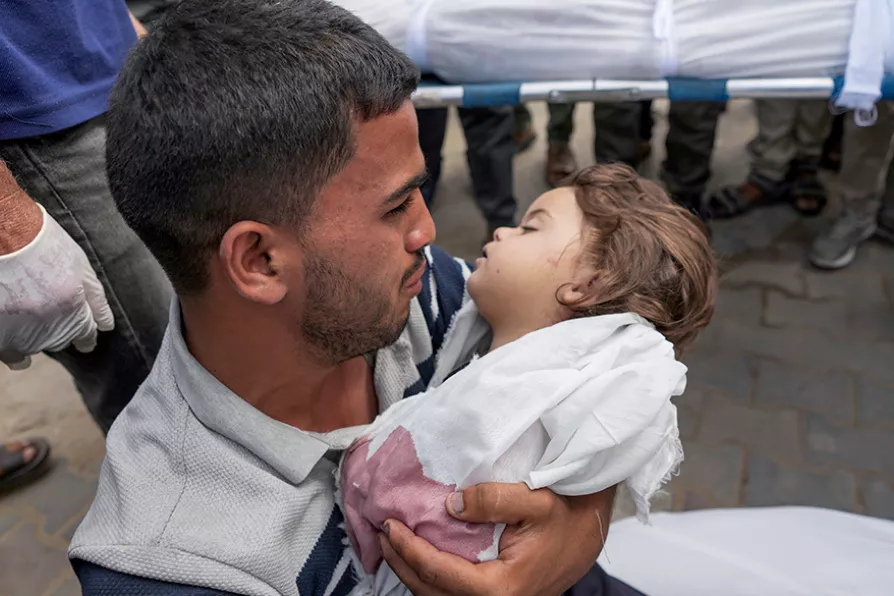As women dominate public services yet face pay gaps, unsafe workloads and rising misogyny, this International Women’s Day and TUC Women’s Conference must be a rallying point, says ANDREA EGAN

 NO ONE IS SAFE: Karam Harara holds the body of his two-year-old daughter Sabreen, who was among 20 people, mostly women and children, killed in an Israeli airstrike in central Gaza, before her funeral at the Al-Aqsa Martyrs Hospital in Deir al Balah last Sunday
NO ONE IS SAFE: Karam Harara holds the body of his two-year-old daughter Sabreen, who was among 20 people, mostly women and children, killed in an Israeli airstrike in central Gaza, before her funeral at the Al-Aqsa Martyrs Hospital in Deir al Balah last Sunday
AFTER seven months, the lead prosecutor at the International Criminal Court (ICC), Karim Khan KC, decided to announce that he would be looking into framing warrants regarding Israel’s genocidal war in Gaza.
With nearly 40,000 people dead and 10,000 missing, and with over 2 million people displaced and threatened with death from bombs or from disease, this war is one of the worst in recent years. Israel’s military has deliberately cut off Gaza from food and water, and has systematically bombed institutions of the state and civil society so that any return of the displaced will be more than difficult.
If the bombing ended today, it would take 14 years to clear out the unexploded ordinance. It would take an unimaginable amount of money and resources to rebuild Gaza so that it could return to some measure of normalcy. Khan is months too late with his statement, but never too late to charge high officials of the Israeli government with war crimes.
Rafah
The Israeli armed forces had told the Palestinians in Gaza that they should abandon their homes north of Wadi Gaza and head to the south. Then, when the Israelis felt that they had largely completed their mission in Gaza City, including destroying all the major cultural and humanitarian institutions there (universities and hospitals, for example), they informed the Palestinians to leave Khan Younis — the second largest city in Gaza — and head to Rafah, the Gaza Strip’s third largest city. This is precisely what over a million Palestinians did in the matter of a few days. They rushed south and then further south.
Now, the Israelis have told the Palestinians in Rafah to leave large parts of that city and head toward the coastline. There is simply no place for people to go, since the Israelis have seized the Rafah crossing into Egypt and they have blocked access to the borderlands near Israel (including the Kerem Shalom crossing). In a hurry, over 800,000 Palestinians have left Rafah and headed toward the Mediterranean Sea. They are living in makeshift shelters, unable to find decent food and water. Famine and disease are twins in this situation.
Northern Gaza
Between October 2023 and January 2024, the Israeli aircraft and tanks pummelled northern Gaza, particularly Gaza City. The level of bombardment was stark, with the Israelis — well-armed by the US and Britain — hitting any building that they felt should be a target. Entire neighbourhoods in Gaza City have been levelled, and entire families have been wiped out.
One of the areas particularly hard hit from the air was the Jabaliya refugee camp, set up in 1948 by those who had been forcibly displaced by the new Israeli states. Israel’s air force was unrelenting, hitting this entirely civilian area with maximum force. When the Israelis left the camp in early February 2024, al-Jazeera’s Anas al-Sharif went and spoke to residents who told him, “Nothing was spared. Land, houses, and trees were all destroyed. Nothing is habitable, but we will remain steadfast and unwavering with our strong determination.”
In May 2024, the Israelis returned to bomb the camp, once more killing civilians in this highly congested area. During the bombardment, Ibrahim Khaled who lives in the camp said on WhatsApp: “Today is the most difficult in terms of the occupation’s bombardment; air strikes, tank shelling have been going on non-stop.”

RAMZY BAROUD looks at how entire West Bank communities have been shattered, their social and physical fabric deliberately dismantled by Israel to enable its formal annexation

Taking a brief look at who the US president surrounds himself with reveals a team dedicated to the complete erasure of Palestine, not justice and civil rights for its people, writes TERRY HANSEN












